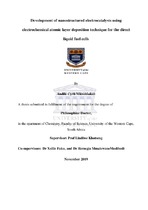| dc.contributor.advisor | Khotseng, Lindiwe | |
| dc.contributor.advisor | Fuku, Xolile | |
| dc.contributor.advisor | MmalewaneModibedi, Remegia | |
| dc.contributor.author | Mkhohlakali, Andile Cyril | |
| dc.date.accessioned | 2020-10-06T13:17:13Z | |
| dc.date.available | 2020-10-06T13:17:13Z | |
| dc.date.issued | 2020 | |
| dc.identifier.uri | http://hdl.handle.net/11394/7346 | |
| dc.description | Philosophiae Doctor - PhD | en_US |
| dc.description.abstract | The depletion of fossil fuel resources such as coal and the concern of climatic change arising from the emission of greenhouse gases (GHG) and global warming [1] lead to the identification of the 'hydrogen economy' as one of the renewable energy sources and possible futuristic energy conversion solution. Sources of hydrogen as fuel such as water through electrolysis and liquid organic fuel (Hydrogen carriers) have been found as potential game-changers and received increased attention, due to its low-carbon emission. | en_US |
| dc.language.iso | en | en_US |
| dc.publisher | University of Western Cape | en_US |
| dc.subject | Nanostructured thin film | en_US |
| dc.subject | Surface limited redox replacement | en_US |
| dc.subject | Electrocatalysis | en_US |
| dc.subject | Alkaline direct liquid fuel cell | en_US |
| dc.subject | Ethanol oxidation | en_US |
| dc.title | Development of nanostructured electrocatalysts using electrochemical atomic layer deposition technique for the direct liquid fuel cells By | en_US |
| dc.rights.holder | University of Western Cape | en_US |

